 Petzlover
Petzlover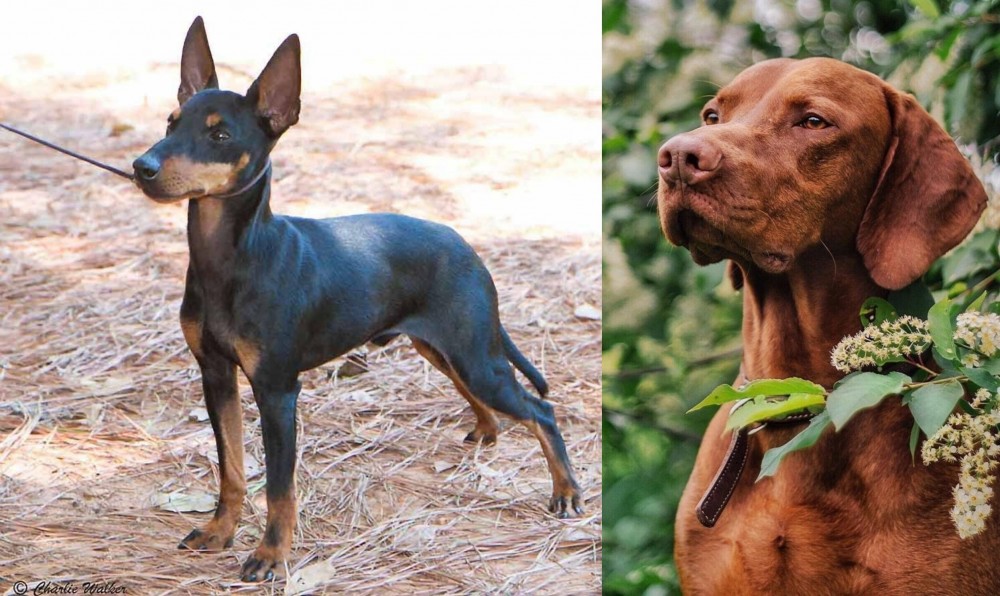 English Toy Terrier (Black & Tan) is originated from United Kingdom but Vizsla is originated from Hungary. English Toy Terrier (Black & Tan) may grow 7 cm / 3 inches higher than Vizsla. English Toy Terrier (Black & Tan) may weigh 26 kg / 57 pounds lesser than Vizsla. English Toy Terrier (Black & Tan) may live 3 years more than Vizsla. Both English Toy Terrier (Black & Tan) and Vizsla has almost same litter size. English Toy Terrier (Black & Tan) requires Moderate Maintenance. But Vizsla requires Low Maintenance
English Toy Terrier (Black & Tan) is originated from United Kingdom but Vizsla is originated from Hungary. English Toy Terrier (Black & Tan) may grow 7 cm / 3 inches higher than Vizsla. English Toy Terrier (Black & Tan) may weigh 26 kg / 57 pounds lesser than Vizsla. English Toy Terrier (Black & Tan) may live 3 years more than Vizsla. Both English Toy Terrier (Black & Tan) and Vizsla has almost same litter size. English Toy Terrier (Black & Tan) requires Moderate Maintenance. But Vizsla requires Low Maintenance
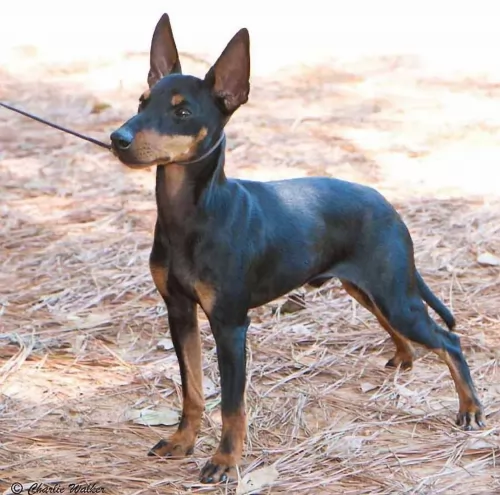 They English Toy Terrier (Black & Tan) is closely related to the Manchester Terrier and the Old English Black and Tan Terrier. The English Toy Terrier was developed to entertain humans in the rat pit due to its speed and agility. This is a sport that was very popular in English cities during Victorian times. Terriers went into the pits with a large number of rats and the winner would be the dog that killed a certain number of rats the fastest. The watchers would take bets on their favorite dog.
They English Toy Terrier (Black & Tan) is closely related to the Manchester Terrier and the Old English Black and Tan Terrier. The English Toy Terrier was developed to entertain humans in the rat pit due to its speed and agility. This is a sport that was very popular in English cities during Victorian times. Terriers went into the pits with a large number of rats and the winner would be the dog that killed a certain number of rats the fastest. The watchers would take bets on their favorite dog.
The English Toy Terrier was developed to be smaller than the Manchester Terrier, because smaller dogs were desired for the pit. In 1848 a small 2.5 kg black and tan terrier took less than an hour to kill 300 rats. When the Kennel Club was formed the sport of rat killing was outlawed. Because it was such a good looking dog, the black and tan was soon excelling in the show ring. To begin with there was one breed of Black and Tan Terriers and two weight classes. In 1920, the two were divided into separate breeds – the Manchester Terrier and the Black and Tan Terrier. It wasn’t until 1962 that the name changed to the English Toy Terrier (Black and Tan).In 1959, the declining numbers of Manchester Terriers caused the AKC to combine them again into one breed with two kinds: Toy and Standard.
Today the English Toy Terrier is one of the most vulnerable of the native breeds and efforts are in place to increase the gene pool and popularity of the dog. The UKC has also re-registered the English Toy Terrier (Black and Tan) in the stud book if it is a certified Toy. The breed is not AKC recognized.
 The Hungarian Vizsla or Magyar Vizsla is a hunting dog developed in Hungry. It is the smallest of the pointer-retriever type breeds. They are loyal family dogs and hunt fowl and upland game. It was rare for a hunting dog to also be a companion and family dog, but the Vizsla is. The first time the Vizsla came to the attention of anyone outside its area was 1357 in a publication written for King Louis I of Hungary. They were kept mostly by barons and warlords and preserved without any interbreeding for centuries.
The Hungarian Vizsla or Magyar Vizsla is a hunting dog developed in Hungry. It is the smallest of the pointer-retriever type breeds. They are loyal family dogs and hunt fowl and upland game. It was rare for a hunting dog to also be a companion and family dog, but the Vizsla is. The first time the Vizsla came to the attention of anyone outside its area was 1357 in a publication written for King Louis I of Hungary. They were kept mostly by barons and warlords and preserved without any interbreeding for centuries.
Through all the occupations, revolutions and world wars, the Vizsla survived. Still there were some points in their history where they were almost extinct. In the 1800’s English Pointers and German Shorthaired Pointers almost replaced them. After World War II they were almost extinct again with only a dozen or so left in the country.
Breeders across Hungry brought them back again. They were also bred in Serbia, Slovakia, Austria and Romania. They came to the states after the war and quickly were embraced. The Vizsla Club of America was formed so that they could be recognized by the American Kennel Club. This happened in 1960 and the Vizsla quickly became a champion in several AKC specialties.
The Weimaraner, the German Shorthaired Pointers, the Wirehaired Vizsla and other pointers were developed from the Vizsla and then used to re-establish the breed following World War II.
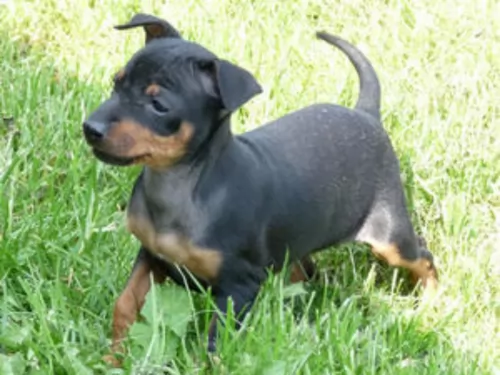 The English Toy Terrier is a small compact breed that resembles the Miniature Pinscher and the Manchester Terrier. The English Toy Terrier has a narrow but long head with a black nose, wedge muzzle and dark, almond shaped eyes. The ears are flame shaped and the chest is deep and narrow. He has thick legs and a tapered tail. The breed is of course black and tan – with the tan on the face, chest and legs.
The English Toy Terrier is a small compact breed that resembles the Miniature Pinscher and the Manchester Terrier. The English Toy Terrier has a narrow but long head with a black nose, wedge muzzle and dark, almond shaped eyes. The ears are flame shaped and the chest is deep and narrow. He has thick legs and a tapered tail. The breed is of course black and tan – with the tan on the face, chest and legs.
 The golden/rust colored Vizsla is easily distinguished from other breed. They are a medium sixed pointer with a lean frame and light on their feet. They have long ears that are silky to the touch and well defined muscular structure. Their nose is a red color blending in with their coat color. Their eyes and nails also blend in with the color of the coat.
The golden/rust colored Vizsla is easily distinguished from other breed. They are a medium sixed pointer with a lean frame and light on their feet. They have long ears that are silky to the touch and well defined muscular structure. Their nose is a red color blending in with their coat color. Their eyes and nails also blend in with the color of the coat.
For the most part they are some shade of golden-rust, but today there are also some solid rust dogs as well. Officially the coat can be russet gold, copper-brown, or dark sandy gold. It cannot be mahogany red or pale yellow. The coat is dense, smooth, short and without an undercoat. They have docked tails as well.
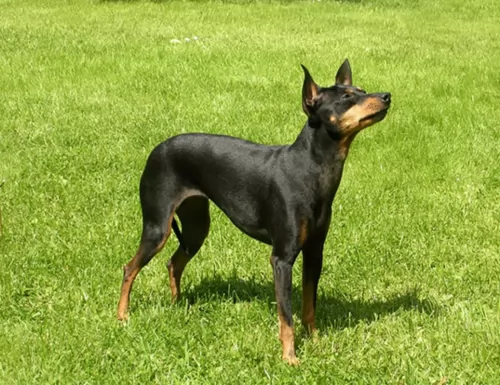 The English Toy Terrier is a stubborn, strong willed little dog. It has a fearless disposition and its alertness make it a great candidate for a guard dog despite its size. They will chase small animals due to their innate prey drive. They are affectionate and loyal and need to be with people. They love to be cuddled and petted, but usually choose one person that they become very close to. He is more than a lap dog. He can be playful, or he can be a small working dog.
The English Toy Terrier is a stubborn, strong willed little dog. It has a fearless disposition and its alertness make it a great candidate for a guard dog despite its size. They will chase small animals due to their innate prey drive. They are affectionate and loyal and need to be with people. They love to be cuddled and petted, but usually choose one person that they become very close to. He is more than a lap dog. He can be playful, or he can be a small working dog.
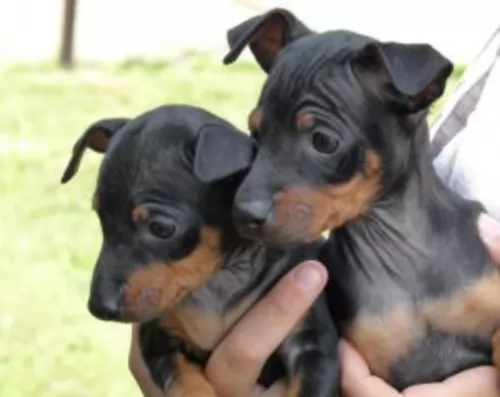 Like many Toy dogs, the English Toy Terrier is susceptible to:
Like many Toy dogs, the English Toy Terrier is susceptible to:
Dislocated kneecap – many small breeds are susceptible to this.
There has been a congenital line of deafness in the English Toy Terrier since it was developed with a cross from the English White Terrier. Unfortunately, some still breed these deaf dogs and continue to pass on the condition.
More painful than in the human eye, pressure builds up behind the eye ball. Dogs build up more pressure than humans and this can lead to blindness.
 The Vizsla have few health issues but the ones they do have are quite serious. They include:
The Vizsla have few health issues but the ones they do have are quite serious. They include:
• Cancer (Mast cell, Lymphoma and Hemangiosarcoma) – as will most dogs it can be treated but is still likely to kill the dog.
• Hip dysplasia is rare, but cases have been noted. Can cause lameness and/or arthritis.
• Sebaceous adenitis – rare skin disease found more often in cats or birds than in dogs.
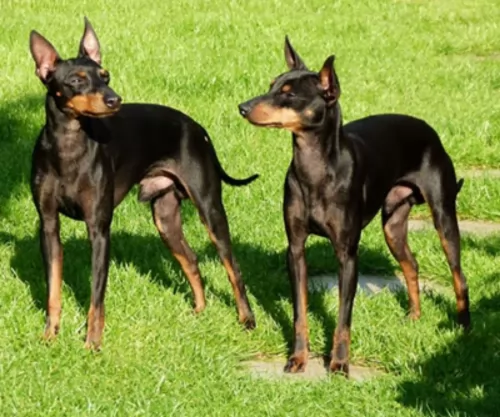 As a high energy small dog feed a high quality dry food that is designed specifically for small dogs. Feed about ¼ of a cup of food split into 2 meals.
As a high energy small dog feed a high quality dry food that is designed specifically for small dogs. Feed about ¼ of a cup of food split into 2 meals.
In addition to the health issues mentioned above:
This is an inherited blood disease in which a lack of protein has a negative effect of the platelets. This causes them not to form clots and so the dog has a bleeding issue.
Degeneration of the femur ball joint due to a blood deficiency issue. This can lead to arthritis.
Affects the lens by blocking the drainage from the eye creating a glaucoma like pressure.
The English Toy Terrier can develop skin issues so watch him closely.
The English Toy Terrier can be very energetic but that doesn’t actually mean she needs a ton of exercise. Because she is small she does not need as much as you might think. A half hour walk once a day is enough or just letting her run in your fenced yard.
He is an intelligent little dog who needs mental stimulation as much if not more than the solution. Play games like catch, hide and seek, frisbee, and performing tricks.
 Feeding the puppy This is a very active dog and he need a high calorie diet as a puppy. Feed 4-5 cups in 3-4 smaller meals per day.
Feeding the puppy This is a very active dog and he need a high calorie diet as a puppy. Feed 4-5 cups in 3-4 smaller meals per day.
2.Feeding the adult Feed the adult high calorie food if you exercise her enough. Feed 3 cups of food twice a day.
4. Exercise They love to run but don’t’ overdo it until they are at least 18 to 24 months old. They stay very playful their entire lives and excel at AKC competitions. They are good at agility, field trials, scent work, obedience, conformation, dock diving, rally, lure coursing, track and barn hunt.